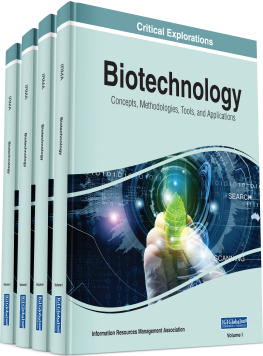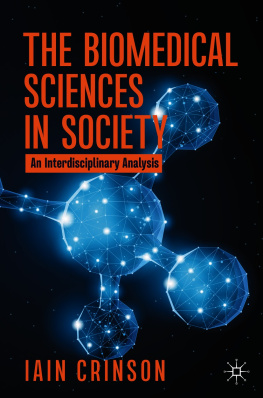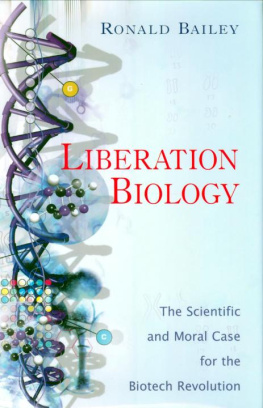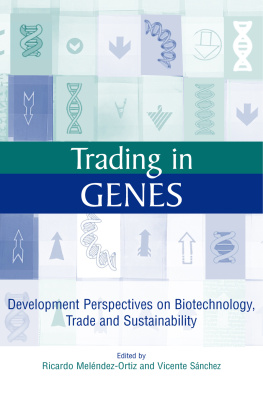Nico Stehr - Biotechnology: Between Commerce and Civil Society
Here you can read online Nico Stehr - Biotechnology: Between Commerce and Civil Society full text of the book (entire story) in english for free. Download pdf and epub, get meaning, cover and reviews about this ebook. year: 2017, publisher: Routledge, genre: Politics. Description of the work, (preface) as well as reviews are available. Best literature library LitArk.com created for fans of good reading and offers a wide selection of genres:
Romance novel
Science fiction
Adventure
Detective
Science
History
Home and family
Prose
Art
Politics
Computer
Non-fiction
Religion
Business
Children
Humor
Choose a favorite category and find really read worthwhile books. Enjoy immersion in the world of imagination, feel the emotions of the characters or learn something new for yourself, make an fascinating discovery.

- Book:Biotechnology: Between Commerce and Civil Society
- Author:
- Publisher:Routledge
- Genre:
- Year:2017
- Rating:3 / 5
- Favourites:Add to favourites
- Your mark:
Biotechnology: Between Commerce and Civil Society: summary, description and annotation
We offer to read an annotation, description, summary or preface (depends on what the author of the book "Biotechnology: Between Commerce and Civil Society" wrote himself). If you haven't found the necessary information about the book — write in the comments, we will try to find it.
While other books have addressed isolated aspects of recent developments in the biomedical sciences, Biotechnology: Between Commerce and Civil Society is the first book tgo engage with the full range of biotechnologys implications for social science and for society at large. -Professor Volker Meja
New scientific knowledge is no longer merely the key to unlocking the secrets of nature and society. It now represents the becoming of a new world. Scientific developments affect the ways in which we conduct our affairs, as well as how we comprehend the changes underway as the result of novel technical artefacts and scientific knowledge. The practical fruits of biotechnology are a case in point; they have grasped our imaginations, and generated worldwide debate and concern. Debates on biotechnology shift between images of utopia and dystopia. The social sciences deserve a voice in the debate, and can do so through sober examination of the economic, social, and cultural implications of biotechnology. Some economists even predict that the importance of biotechnology as the technology of the future will far exceed that of the information technologies, in particular the Internet. The contributors to this volume are drawn from a broad spectrum of the social sciences, and include Nico Stehr, Gene Rosa, Steve Fuller, Steve Best and Douglas Kellner, Nikolas Rose, Fred Buttel, Javier Lezaun, Anne Kerr, Susanna Hornig Priest and Toby Ten Eyck, Martin Schulte, Alexander Somek, Steven P. Vallas, Daniel Lee Kleinman, Abby Kinchy and Raul Necochea, Herbert Gottweis, J. Rogers Hollingsworth, Gysli Pblsson, Elizabeth Ettore, Richard Hindmarch and Reiner Grundmann. The impact of science on society is destined to be a fundamental concern in the new century. This volume illustrates the contributions anthropology, law, political science, and sociology can make to the ongoing discussions about the role of biotechnology in modern societies. Nico Stehr is senior research associate, Institut for Technikfolgenabschotzung, Forschungszentrum Karlsruhe and Institut for Kostenforschung, GKSS, Germany. He also is a fellow in the Center for Advanced Cultural Studies in Essen, Germany, editor of the Canadian Journal of Sociology, and a fellow of the Royal Society of Canada. Among his recent books are Werner Sombart: Economic Life in the Modern Age (with Reiner Grundmann, published by Transaction); The Fragility of Modern Societies: Knowledge and Risk in the Information Age; Knowledge and Economic Conduct: The Social Foundations of the Modern Economy; and Wissenspolitik: Die ?berwachung des Wissens.
Nico Stehr: author's other books
Who wrote Biotechnology: Between Commerce and Civil Society? Find out the surname, the name of the author of the book and a list of all author's works by series.







